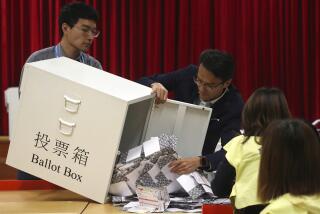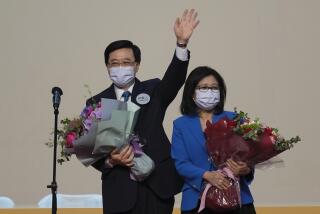Hong Kong Seeks Reform -- Slowly
HONG KONG — Chief Executive Tung Chee-hwa asked for Beijing’s approval Thursday to overhaul Hong Kong’s electoral system, but the manner and wording of his request reduced hopes among democracy advocates that the territory’s next leaders would be elected by popular vote.
In a six-page statement hand-delivered to the National People’s Congress Standing Committee by a member of his Cabinet, Tung said the method for selecting the territory’s next chief executive in 2007 and its 60-member Legislative Council in 2008 “should be amended so as to enable Hong Kong’s constitutional development to move forward.”
Several months ago, such a recommendation would have been viewed as a major concession to democratic forces. But Thursday’s move was seen more as a tactical step dictated by pressure for change from virtually every significant political constituency in the territory. The conditions set out in his request -- which stressed both Beijing’s control over the process and the need for gradual movement toward universal suffrage -- seemed to all but rule out swift, full electoral democracy.
“The pace should not be too fast,” Tung’s report said.
China’s leaders have repeatedly made clear that stability is their top priority for Hong Kong. They are believed to be worried that a broad perception that Tung is performing poorly and pressure for democratic reforms will dilute the territory’s executive-led government and, with it, their control over the region.
Tung is the only chief executive Hong Kong has had in the seven years since the former British colony was returned to Chinese sovereignty. His unpopularity, and the widely held view that his government is failing the territory’s 6.9 million people, have fueled disenchantment with the system that selected him. Only 800 carefully selected “elite” residents have the right to vote for the chief executive.
In legislative elections scheduled for September, half of the 60 members of Hong Kong’s Legislative Council will be chosen by popular vote. The other half will be chosen by narrowly based professional or trade groups. The wording of Tung’s report indicated a preference to preserve these special constituencies.
At a brief news conference Thursday, Tung declined to describe exactly how his successor might be selected, but unofficial proposals floated in the media include a gradual expansion of the elite group of electors or turning that group into a nominating body that would in effect screen candidates so that the entire electorate would choose among individuals pre-approved by Beijing.
Many democracy advocates also complained that Tung had submitted his report hastily, and without consulting them. Only 24 hours earlier, a group of 21 pro-democracy legislators had asked to meet with him before he submitted his recommendations to Beijing.
“We’re very disappointed with the procedure, that he didn’t release the report before sending it to Beijing,” said Lee Wing Tat, Democratic Party vice president. “It wasn’t handled in a transparent manner.”
Under a formula decided by Beijing last week, the Standing Committee must endorse Tung’s report before debate can begin in the territory on how the selection process might be changed. Any consensus reached in Hong Kong must then win Standing Committee approval before going into effect.
For some analysts, the content of the report and the speed with which Tung submitted it -- only 10 days after Beijing had set out the procedure -- underscored their conviction that the Chinese government had taken charge of the process and planned to move quickly in hopes of catching democracy advocates off balance. It was unclear how soon Beijing might rule on the report.
Pro-government parties and senior members of Tung’s Cabinet hailed the move as the beginning of important change in the territory.
“We’ve opened the door for discussion; we’ve turned a new page,” Hong Kong’s chief secretary and senior civil servant, Donald Tsang, told reporters.
More to Read
Sign up for Essential California
The most important California stories and recommendations in your inbox every morning.
You may occasionally receive promotional content from the Los Angeles Times.









